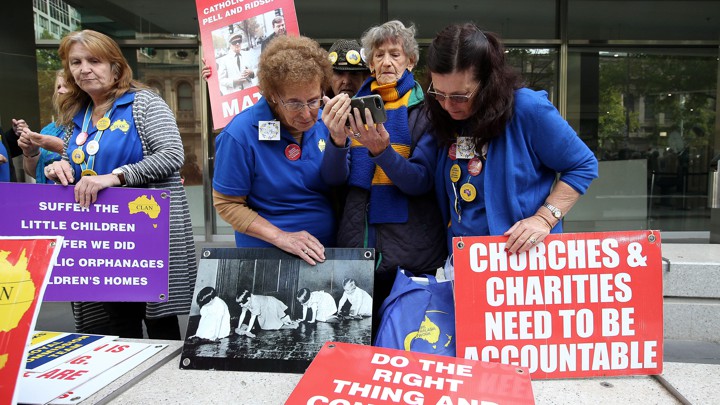Civil Courts Step in to Solve What the Catholic Church Won’t
By Rachel Donadio
This week marked a major turning point in the Catholic Church’s sexual-abuse crisis. An Australian court sentenced Cardinal George Pell to six years in prison for sexually abusing minors, a decision that not only makes him the highest-ranking Church official to face civil justice, but also underscores a central animating tension in the issue: the one between civil and Church authorities. After years in which victims saw Church officials as lax and unresponsive, more protective of the abusers than of the abused, civil justice has moved in and filled the gap. Pell isn’t the only cardinal who’s been on trial. A French court last month convicted Cardinal Philippe Barbarin, the archbishop of Lyon, on charges of covering up for an abusive priest in his diocese in a case brought by a vocal group of victims, La Parole Liberee. Their effort is now the subject of a feature film in France. In the United States, a grand-jury report in Pennsylvania released last summer found evidence of the abuse of 1,000 children—and since then, other states have begun exploring their own grand-jury investigations. Until Pell went back to Australia two years ago to face trial, he was seen as a reformer inside the Vatican. An adviser to Pope Francis, who named him the prefect for the Secretariat of the Economy and a member of the pope’s nine-person advisory council, Pell was known in Vatican City as a straight-talking Anglophone in an opaque Italian-run bureaucracy, a man who garnered enemies by poking under the rocks in the Vatican’s finances. In Australia, though, he has become the emblem of the Church’s abuse of power: Delivering his sentence, a judge spoke of Pell’s “staggering arrogance,” The New York Times reported. Advocates for victims are already hailing the sentence as a major breakthrough. “The mental image of the powerful cardinal behind bars will do more to deter corrupt bishops than anything Pope Francis has done to date,” Anne Barrett Doyle, who runs the advocacy group BishopAccountability.org, said in a statement. Pell, 77, was convicted of three counts of committing an indecent act with, or in the presence of, a child and one count of sexual penetration of a child under the age of 16. A first trial against the cardinal ended in August with a hung jury and a mistrial. Then, in a retrial in November, a jury found Pell guilty. The latest set of hearings unfolded mostly in a media blackout because of Australia’s defamation laws, which are favorable to plaintiffs. But with Pell’s sentencing this week, new and grim details have emerged. One of the victims, who was 13 at the time of the abuse, testified that Pell had pushed both him and another 13-year-old boy toward the cardinal’s genitals, and that Pell had then put his penis into the boy’s mouth, before telling him to remove his pants, touching himself and the boy at the same time, according to The New York Times. Pell has declared his innocence and has said he will appeal the conviction. As is often the case in trials about sexual abuse, there is no corroborating evidence, which pits the word of the victims against the word of the cardinal. The transcripts have not been made public. One of Pell’s strongest defenders has been George Weigel, a prominent Catholic author and commentator. Writing in National Review last month, Weigel noted, “Before the trial, one of the complainants died, having told his mother that he had never been assaulted. During the trial, there was no corroboration of the surviving complainant’s charges.” Last month, Weigel wrote a vehement defense of Pell—who he said was a friend of 50 years—comparing the atmosphere in Australia to the Salem witch trials, and asserting that the Australian police had overreached and gone on a “fishing expedition” against the cardinal. But the reach—or even the possible overreach—of civil authorities is a response to the dramatic underreach by the Church for so many years, when the dominant culture was one of evasion and cover-up, and when cases sent from local dioceses to the Vatican languished in a backlog in its doctrinal office, the Congregation for the Doctrine of the Faith. The Vatican has said that the CDF will conduct its own investigation into Pell, which could lead to a Church trial. Once again, the wheels of Vatican justice grind far more slowly than those of civil justice. Read: The Catholic Church’s battle between rhetoric and reality By most accounts, Francis is aware of that. Last month, he held a rare meeting at the Vatican on protecting children in the Church. It was aimed at winning over the hearts and minds of clergy who might not have understood the depth of the abuse crisis. The summit was a giant step for the Vatican, but a small one for victims’ groups, who wanted more concrete measures. In the coming weeks, Francis is expected to issue an apostolic letter that will address the abuse crisis. But it will take more than the fine print of a motu proprio, as such letters are called, to end the crisis. The momentum here is in the civil courts, not Vatican City.
|
.
Any original material on these pages is copyright © BishopAccountability.org 2004. Reproduce freely with attribution.
